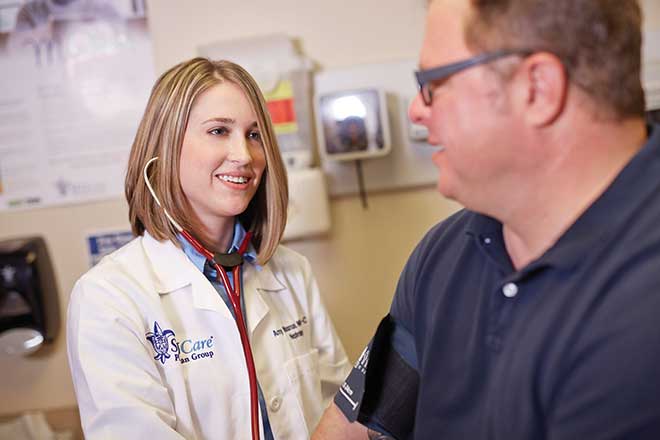One in three adults nationwide has chronic high blood pressure, also called hypertension. The problem is worse in St. Louis, where 40 percent of adults are affected, says Dr. Paul Schmitz of the SLUCare Hypertension Clinic. Left unchecked, hypertension can cause damage to the eyes, kidneys or blood vessels, and can increase the risk for heart disease and stroke, two of the leading causes of death in the U.S. Unfortunately, only one-third of hypertension cases are controlled, Schmitz says. “It’s the silent killer,” he says. “It’s up to us to educate people that while they might not have symptoms today, they eventually will have problems.”
Opened about a year ago, the SLUCare Hypertension Clinic is the only one of its kind in St. Louis, offering innovative tools and strategies for managing hypertension, Schmitz says. Being specialized allows the clinic to better identify the roughly 30 percent of people who are over- or under-treated for the condition. Most physicians rely on a common in-office test for measuring blood pressure, but Schmitz’s team conducts a 24-hour assessment that paints a fuller picture of a patient’s situation. “We have techniques that simply aren’t available routinely in other clinics,” he says. “We do an entire analysis of risk to make recommendations for drug therapy and lifestyle modifications to better control blood pressure.”
The clinic provides highly individualized care. Doctors spend time with each patient looking for causes of high blood pressure, including lifestyle factors like salt intake and over-the-counter medications. They also discuss traditional treatment options and alternative therapies like biofeedback. “We’re trying to look at each patient as an individual,” Schmitz says. “We work with them to tailor a regimen that fits their lifestyle.” Additionally, the clinic is using its unique equipment to conduct an important research study. Schmitz’s team is measuring changes in arterial anatomy before hypertension develops. They hope the findings will someday allow doctors to predict who will develop hypertension so treatment can begin earlier for better long-term results.
Unlike some specialty clinics, Schmitz says SLUCare Hypertension Clinic doesn’t want clients for life. Instead, the clinic wants to relieve some pressure on overworked doctors who don’t have time to fully assess and treat hypertensive patients. “The condition can be de-emphasized in a routine visit because the primary care physician has so many other things to deal with,” Schmitz says. “We can help them diagnose and manage high blood pressure to save them that time.” After one or two visits, most patients return to their regular doctors for ongoing support in implementing their new personalized treatment program. The results have been impressive, Schmitz says, and the patient count has quadrupled since the clinic opened. “We feel pretty confident we can improve anybody’s blood pressure.”
Physician assistant Amy Krieg of the SLUCare Hypertension Clinic
Photo courtesy of SLUCare Physician Group
[The SLUCare Hypertension Clinic, located at 3660 Vista Ave., Ste. 202, offers advanced tools to better manage blood pressure. For more information, visit slucare.edu/bloodpressure or call 314.977.4440.]








